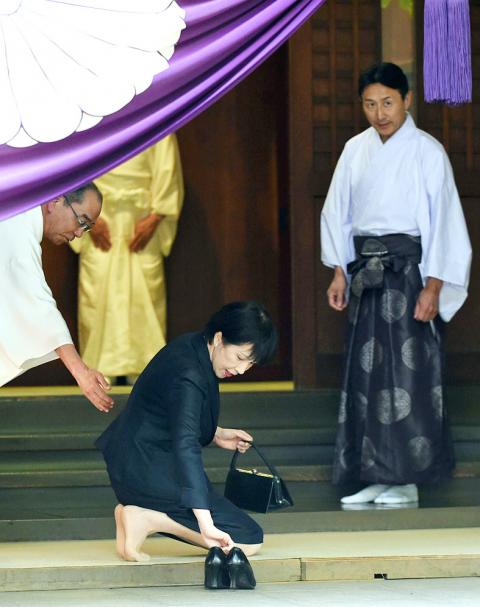Just hours after Japanese Prime Minister Shinzo Abe sat down for his first substantial talks with Chinese President Xi Jinping (習近平), three of his Cabinet ministers yesterday visited the war shrine that Beijing sees as a symbol of Tokyo’s violent past.
Visits by the three have the potential to muddy diplomatic waters that were starting to clear after their nationalist boss sat down with the Chinese president on the sidelines of a regional summit in Jakarta, Indonesia.
“I offered my sincere appreciation for the people who fought and sacrificed their precious lives for the sake of the country,” Japanese National Public Safety Commission Minister Eriko Yamatani told reporters after her pilgrimage.

Photo: AFP
“I pledged efforts for building a peaceful country,” said the minister, known for her strident nationalistic views.
She was followed over the next few hours by Haruko Arimura, state minister in charge of female empowerment, and Japanese Internal Affairs and Communication Minister Sanae Takaichi.
More than 100 Japanese lawmakers went to the shrine on Wednesday to coincide with its spring festival, even as officials were making final arrangements for the Xi-Abe meet.
Abe had asked his ministers not to visit before the talks happened, according to Jiji Press.
Xi and Abe held discussions in Jakarta for about 30 minutes, their first lengthy pow-wow since both men came to the helm of nations that are bitterly at odds over history and current territorial disputes.
Abe later told reporters that they had a “very meaningful summit meeting” and bilateral relations were improving.
In Tokyo yesterday, Japanese Chief Cabinet Secretary Yoshihide Suga, speaking after Yamatani’s pilgrimage, said it should have no bearing on warming China ties.
“I don’t think there will be [any impact]. The visit was made in a personal capacity,” Suga said.
Masaru Ikei, professor emeritus at Keio University and an expert on Japanese diplomatic history, said shrine visits like this were somewhat inevitable, but unlikely to be a disaster.
Taiwan expressed regret yesterday over the visit to the shrine.
Ministry of Foreign Affairs spokeswoman Anna Kao (高安) said the government regrets the visit by more than 100 Japanese lawmakers to the shrine a day earlier.
The shrine honors Imperial Japan’s war dead, including 30,304 Taiwanese. It is seen by many as a symbol of Japan’s wartime militarism.
Noting that this year marks the 70th anniversary of the end of World War II, Kao said the government urged Japanese politicians to look squarely at historical facts and reflect deeply upon themselves.
Kao called on Japan to refrain from actions that could hurt the feelings of the people in neighboring countries, and to develop friendly relations with other countries to promote regional peace and stability.

‘TAIWAN-FRIENDLY’: The last time the Web site fact sheet removed the lines on the US not supporting Taiwanese independence was during the Biden administration in 2022 The US Department of State has removed a statement on its Web site that it does not support Taiwanese independence, among changes that the Taiwanese government praised yesterday as supporting Taiwan. The Taiwan-US relations fact sheet, produced by the department’s Bureau of East Asian and Pacific Affairs, previously stated that the US opposes “any unilateral changes to the status quo from either side; we do not support Taiwan independence; and we expect cross-strait differences to be resolved by peaceful means.” In the updated version published on Thursday, the line stating that the US does not support Taiwanese independence had been removed. The updated

‘CORRECT IDENTIFICATION’: Beginning in May, Taiwanese married to Japanese can register their home country as Taiwan in their spouse’s family record, ‘Nikkei Asia’ said The government yesterday thanked Japan for revising rules that would allow Taiwanese nationals married to Japanese citizens to list their home country as “Taiwan” in the official family record database. At present, Taiwanese have to select “China.” Minister of Foreign Affairs Lin Chia-lung (林佳龍) said the new rule, set to be implemented in May, would now “correctly” identify Taiwanese in Japan and help protect their rights, the Ministry of Foreign Affairs said in a statement. The statement was released after Nikkei Asia reported the new policy earlier yesterday. The name and nationality of a non-Japanese person marrying a Japanese national is added to the

AT RISK: The council reiterated that people should seriously consider the necessity of visiting China, after Beijing passed 22 guidelines to punish ‘die-hard’ separatists The Mainland Affairs Council (MAC) has since Jan. 1 last year received 65 petitions regarding Taiwanese who were interrogated or detained in China, MAC Minister Chiu Chui-cheng (邱垂正) said yesterday. Fifty-two either went missing or had their personal freedoms restricted, with some put in criminal detention, while 13 were interrogated and temporarily detained, he said in a radio interview. On June 21 last year, China announced 22 guidelines to punish “die-hard Taiwanese independence separatists,” allowing Chinese courts to try people in absentia. The guidelines are uncivilized and inhumane, allowing Beijing to seize assets and issue the death penalty, with no regard for potential

‘UNITED FRONT’ FRONTS: Barring contact with Huaqiao and Jinan universities is needed to stop China targeting Taiwanese students, the education minister said Taiwan has blacklisted two Chinese universities from conducting academic exchange programs in the nation after reports that the institutes are arms of Beijing’s United Front Work Department, Minister of Education Cheng Ying-yao (鄭英耀) said in an exclusive interview with the Chinese-language Liberty Times (the Taipei Times’ sister paper) published yesterday. China’s Huaqiao University in Xiamen and Quanzhou, as well as Jinan University in Guangzhou, which have 600 and 1,500 Taiwanese on their rolls respectively, are under direct control of the Chinese government’s political warfare branch, Cheng said, citing reports by national security officials. A comprehensive ban on Taiwanese institutions collaborating or